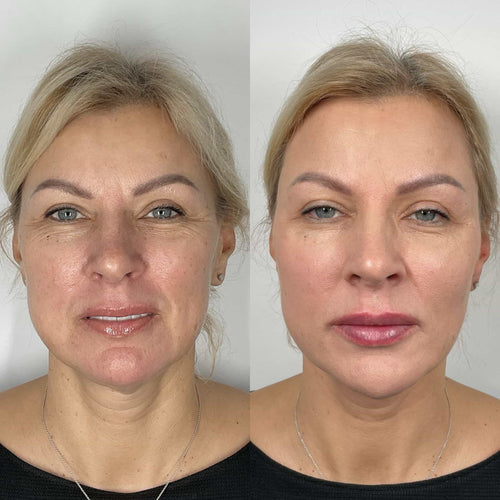Book Your Dermal Filler Session with Dr. Laura Geige Today
Safety Considerations
Potential Risks
It’s important to consult with a healthcare professional before making any decisions about cosmetic procedures while breastfeeding. There are potential risks associated with lip fillers, and these risks may be magnified during breastfeeding.
One key concern is the possibility of ingredients in lip fillers transferring to breast milk. While research on this specific topic is limited, it’s generally recommended to avoid introducing new substances into your system while breastfeeding, as they could potentially pass through to your baby.
Another consideration is the potential for allergic reactions or complications following the procedure. Any adverse reaction could affect both you and your infant, particularly if it results in inflammation or discomfort.
Reserve Your Dermal Filler Consultation with Dr. Laura Geige Now
Additionally, pain and swelling associated with lip filler injection can temporarily interfere with breastfeeding. It may be difficult to position your baby comfortably or effectively express milk while experiencing these side effects.
It’s crucial to discuss your individual circumstances and medical history with your doctor. They can help you weigh the potential benefits and risks of lip fillers in relation to breastfeeding and advise on the safest course of action for you and your child.
Maternal Health Concerns
Safety considerations regarding cosmetic procedures like lip fillers while breastfeeding are complex and require careful evaluation.
While there’s limited specific research on the direct effects of lip fillers on breast milk or infants, a precautionary approach is generally recommended.
Here’s a breakdown of key maternal health concerns:

Maternal Anesthetic Risks: Most lip filler procedures involve local anesthetic injections. Some anesthetics can cross into breast milk in small amounts.
Although rare, potential infant side effects could include drowsiness or fussiness.
It’s crucial to discuss your medical history and any medications you’re taking with your doctor or dermatologist before undergoing any procedure involving anesthesia.
Allergic Reactions: Hyaluronic acid fillers are the most common type used for lip augmentation. However, allergic reactions, though uncommon, can occur.
If an allergic reaction happens, it could potentially affect both the mother and the nursing infant.
A thorough medical history review and a patch test before the procedure can help minimize this risk.
Injection Site Complications: Like any injection, there’s a risk of bruising, swelling, or infection at the injection site.
While these are usually temporary side effects, they could potentially impact your comfort and well-being while breastfeeding.
Hormonal Influences:** Some studies suggest that cosmetic fillers might interact with hormones.
The exact implications of this interaction on breastfeeding are not fully understood.
It’s essential to consult your doctor for personalized advice based on your individual circumstances and medical history.
Infant Safety
Safety considerations regarding cosmetic procedures while breastfeeding are crucial to ensure both the mother’s and infant’s well-being.
Here are some key points to consider:
-
Potential Allergic Reactions: Lip fillers contain hyaluronic acid, a common ingredient but still capable of triggering allergic reactions in some individuals. Exposure to these substances through breast milk is a concern, and the infant’s immature immune system may be more vulnerable.
-
Migration of Fillers: While rare, there is a possibility that fillers could migrate through the bloodstream and potentially reach breast milk. The long-term effects of this exposure on an infant are unknown.
-
Pain Management and Anesthetics: Local anesthesia used during lip filler procedures may contain ingredients that are not recommended for infants.
-
Hormonal Influences: Some fillers may contain ingredients that can affect hormone levels in both the mother and infant. The potential impact on breastfeeding production and infant development is unclear.
It’s essential to consult with a healthcare professional, specifically an obstetrician or lactation consultant, before undergoing any cosmetic procedures while breastfeeding.
They can provide personalized advice based on your individual circumstances, medical history, and the specific type of filler being considered.
Consultation with Healthcare Professionals
Dermatologist Evaluation
Consulting healthcare professionals is crucial before making any decisions about cosmetic procedures while breastfeeding.
It’s important to discuss your individual circumstances, including the type of lip filler you’re considering, with a doctor who specializes in both dermatology and plastic surgery.
A dermatologist can assess your skin health, identify any potential risks associated with lip fillers during breastfeeding, and recommend safe alternatives if necessary.
They can also provide information about the ingredients used in different lip filler products and help you choose one that is least likely to harm your baby.
During a dermatology evaluation, expect a comprehensive consultation that includes:
- Reviewing your medical history, including any allergies or previous cosmetic procedures.
- Discussing your breastfeeding habits and the age of your baby.
- Analyzing your skin type and desired aesthetic outcome.
- Assessing your overall health and any potential risks associated with lip filler injection during breastfeeding.
The dermatologist may recommend a patch test to check for allergic reactions to the filler ingredients.
Based on their assessment, they will advise you on whether or not lip fillers are safe for you to receive while breastfeeding and provide guidance on potential alternatives.
Remember, your baby’s health is paramount. Prioritize open communication with your healthcare providers and make informed decisions that balance your individual needs with the safety of your child.
Arrange Your Dermal Filler Consultation with Dr. Laura Geige at It’s Me and You Clinic
Lactation Consultant Advice
Consultation with healthcare professionals is crucial before making any decisions regarding cosmetic procedures like lip fillers while breastfeeding.
Your doctor can assess your overall health, including any potential risks associated with injectables and their possible impact on breast milk or your baby’s well-being.
They can also provide personalized advice based on your individual medical history and breastfeeding practices.
A lactation consultant is another valuable resource. They specialize in breastfeeding and can offer guidance on how lip fillers might affect milk supply, let-down reflex, or the baby’s ability to latch.
They can also discuss alternative methods for addressing your concerns about your lips that may be safer during this time.
It’s important to remember that the safety of both you and your baby should always come first. Thoroughly researching the procedure, understanding potential risks and benefits, and seeking professional advice will empower you to make an informed decision.
Risks vs Benefits Discussion
Consultation with a healthcare professional is crucial before making any decisions about cosmetic procedures while breastfeeding.
This conversation will involve a detailed discussion about potential risks and benefits, tailored to your individual circumstances.
**Risks associated** with lip fillers during breastfeeding include:
• **Allergic reactions:** Though rare, some individuals may experience allergic reactions to the filler material.
• Infection:**
• **Migration of filler:** Filler can sometimes move from its intended location, causing irregularities or lumps.
• **Unforeseen side effects:** As with any medical procedure, there are always potential for unforeseen side effects.
The primary concern regarding lip fillers and breastfeeding is the potential for the filler to pass into breast milk and potentially affect your infant.
**Benefits of lip fillers**, on the other hand, may include:
• **Enhanced appearance:** Lip fillers can increase volume, symmetry, and definition.
• Improved confidence:** Feeling more satisfied with one’s appearance can boost self-esteem.
However, it is essential to weigh these potential benefits against the unknown risks to your breastfeeding infant.
During your consultation:
-
Be honest and transparent about your breastfeeding status and any medications you are taking.
-
Ask your healthcare provider detailed questions about potential risks, the type of filler used, and its impact on breast milk.
-
Discuss alternatives to lip fillers or explore safer timing options for the procedure.
Remember, making informed decisions about cosmetic procedures while breastfeeding requires careful consideration, open communication with your healthcare provider, and prioritizing the well-being of both you and your child.
Alternatives to Lip Filler During Breastfeeding
Non-Invasive Options
While lip fillers can enhance fullness and shape, it’s essential to prioritize breastfeeding safety. During this time, many individuals opt for non-invasive alternatives that deliver results without compromising their baby’s well-being.
Lip plumping glosses and balms containing ingredients like hyaluronic acid or peptides offer a temporary solution. These products attract moisture, creating the illusion of fuller lips.
Over-the-counter lip volumizers often contain menthol or cinnamon extract, which create a tingling sensation that temporarily plumps the lips.
Facial exercises can help strengthen the muscles around the lips, potentially enhancing their appearance over time. Simple techniques like puckering and smiling repeatedly can make a subtle difference.
Natural remedies like using honey or coconut oil can provide hydration and nourishment to the lips, contributing to a fuller look.
A healthy diet rich in fruits and vegetables provides essential nutrients that promote skin health, including lip fullness. Staying hydrated by drinking plenty of water is also crucial.
Remember, patience is key when exploring non-invasive options. It takes time for results to become noticeable and may require consistent effort. Consult with a dermatologist or skincare professional for personalized recommendations tailored to your individual needs and preferences.
Timing Considerations
While lip filler injections are generally considered safe for most people, there are some factors to consider during breastfeeding.
Alternatives to lip filler during breastfeeding include:
- Over-the-counter lip plumpers: These products typically contain ingredients like menthol or cinnamon oil that temporarily increase blood flow to the lips, creating a fuller appearance.
- Hyaluronic acid serums and balms: Hyaluronic acid is a naturally occurring substance in the body that helps attract and retain moisture. Applying it topically can hydrate and plump the lips.
- Lip exercises: Regularly performing lip exercises can help strengthen and tone the muscles around the mouth, giving the appearance of fuller lips.
Timing Considerations:**
It’s generally recommended to avoid lip filler injections while breastfeeding.
The FDA has not specifically approved or tested lip fillers for use during breastfeeding. There is limited research on the potential effects of lip fillers on breast milk and infants.
If you’re considering lip filler injections while breastfeeding, it’s crucial to consult with your doctor or a qualified dermatologist. They can assess your individual situation, discuss the risks and benefits, and provide personalized advice.
Cleveland Relationship Therapy Alkhemist LA Decléor Direct Made by Penny Pets R4U
- Why Can’t You Wear Lipstick After Lip Fillers? - November 4, 2025
- What Is The Best Filler For Jowls And Marionette Lines? - November 1, 2025
- What Are The Alternatives To Bum Filler Injections? - October 31, 2025
